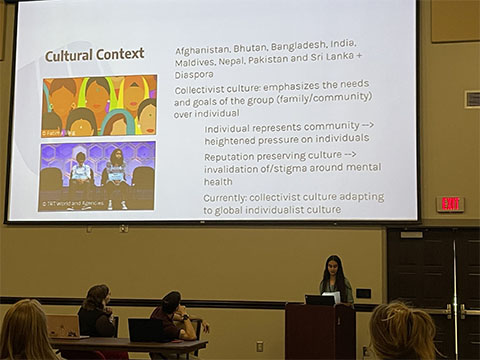15 Oxford students took their research on the road for the 2022 Georgia Undergraduate Research Conference.
After months of preparation and collaboration, more than a dozen Oxford students traveled to Valdosta State University to present their work at the 2022 Georgia Undergraduate Research Conference (GURC). The annual conference—this year held on November 11 and 12—features research from all disciplines and includes not just Georgia colleges but universities from around the country. Oxford will host GURC in 2024 and 2025.

Anusha Kothari (profiled below) was one of 15 Oxford students to present at the 2022 GURC held at Valdosta State University.
This year's Oxford student researchers presented in a variety fields—political science, religious studies, and linguistics, to name just a few—and were each backed by a faculty sponsor. The 15 students who attended were: Ian Goldman, Srisha Jayakumar, Jay Jones, Anusha Kothari, Hannah Kreuziger, Julia Kwak, Cody Nelson, Doreen Okeh, Peyton Panos, Sana Punjani, Mercedes Sarah, Rebecca Urato, Gracie Wilson, Yizhou Yang, Ivan Zhu. For a full list of their research topics, you can access the program here.
Three Oxford professors attended the conference and supported the students both logistically and in their presentations: Emily McLean, Assistant Professor of Biology; Eric Solomon, Visiting Assistant Professor of American Studies and English; and Daniel Walter, Assistant Professor of German and Linguistics.
"GURC is an amazing opportunity for Oxford students to showcase the work they do with their faculty mentors, and it provides a unique place to get first-hand experience presenting at a research-focused conference," Walter said. "Our students had the chance to meet and talk about research with peers and professors from across the state of Georgia. They also gained valuable experience presenting their research, either in poster or oral presentation formats."
The students came to their individual projects in a number of ways, but almost always through their connection with a faculty member. Whether it was their Discovery Seminar or simply taking an interesting course, the atmosphere of student-faculty collaboration was key to the development of each project.
"Our students are among the youngest at the conference, as the majority of other presenters are seniors at their institutions," Walter said. "Oxford students get to work with their mentors to pursue the topics they are interested in during their first two years. We give them both the freedom to explore and guidance on how to best channel their enthusiasm. Our strong showing at GURC is further evidence of Oxford's commitment to helping students get a head start on research opportunities."
Research on the road: Anusha Kothari
In early October, Oxford second-year student Anusha Kothari traveled to York, Pennsylvania with English professor Gwendolynne Reid to present her research at the 2022 Naylor Workshop on Undergraduate Research in Writing Studies—a prestigious, collaborative symposium for undergraduate students. In November, she’d take this same project to GURC.
Kothari’s study, which she shared with faculty and other undergraduate researchers from across the US and Canada, explores mental health recovery narratives by South Asian authors—a topic she came to in Reid’s Discovery Seminar, titled Everyday Genres. Reid, Director of the Writing Program and Assistant Professor of English, continued to work on the subject with Kothari through an independent study. As Kothari’s research progressed, Reid encouraged her to submit to the Naylor Workshop. Soon after, they hit the road together.
“During our Discovery Seminar, I was impressed by Anusha’s willingness to engage with challenging theory and research to answer questions important to her,” Reid said. “Throughout the process, I have also been impressed by Anusha’s persistence and commitment to getting her analysis right. She feels the significance of her work along with its ethical implications strongly and has taken the time to produce an analysis that can benefit members of South Asian communities who might read it, as well as others seeking to understand this context.”
Kothari is currently working on a manuscript based on this project, which she plans to submit to an undergraduate journal.
The feedback she received at the workshop proved invaluable—not just in its practical implications on her research, but also in the way it connected her to a network of critical thinkers.
“My favorite aspect about the workshop was collaborating with both peers and scholars from backgrounds very different from mine,” Kothari said. “It was incredible to learn from their experiences and exciting to find similarities between our work…. After sharing my research, I was met with uplifting, thought-provoking, and detail-oriented responses which reassured me and gave me a refreshed confidence.”
Kothari, who is on a pre-med track, has enjoyed the interdisciplinary, liberal arts-focused curriculum at Oxford and shared her appreciation for Reid’s mentorship: “It's been incredible working with Dr. Reid throughout my time at Oxford,” she said. “She has taken the time to get to know my personality, interests, and working style and supports me in a very personalized and encouraging way.”
Reid was “extremely proud” of Kothari at the workshop and felt inspired by seeing her interact with fellow undergraduate researchers.
“It reminds me why I do what I do,” Reid said. “With only first- and second-year students at Oxford, faculty have time to cultivate early undergraduates in pursuing their interests. That can lead to exciting interdisciplinary projects like Anusha's, which combines theory and research from rhetorical genre studies, linguistics, anthropology, medical humanities, and more. These kinds of projects can make genuine contributions to important conversations while also helping students make meaningful connections between the disciplines they’re exploring as part of their general education. Students don’t always realize the significance of their general education courses until much later. Anusha and students like her are making sense of them in real time. It’s inspiring to watch and to think I’m of some help to her on her journey.”

